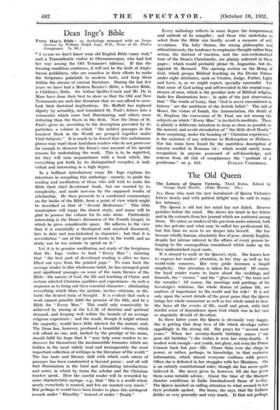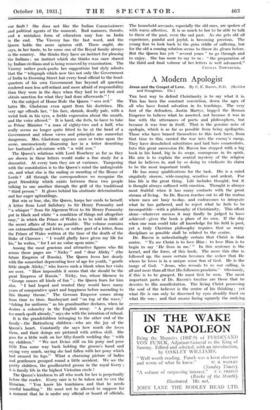The Old Queen
The Letters of Queen Victoria. Third Series. Edited by George Earle Buckle. (John Murray. 25s.)
ALL those who read the new instalment of Queen Victoria's letters slowly and with patient delight may be said to enjoy her intimacy.
The Queen is old but her mind has not failed. Reserve perishes before the mind. She shows her heart in her letters and in the extracts from her journal which are scattered among them. We enter, as readers of the previous series entered, both into her private and what may be called her professional life, but this time we seem to see deeper into herself. She has become wholly human, absolutely free of pose, utterly English, despite her intense interest in the affairs of every person be- longing to the cosmopolitan cousinhood which make up the then undiminished royal caste.
It is absurd to smile at the Queen's style. She knows how to engross her readers' attention, in her tiny as well as her world-wide concerns. Her very pride becomes a limpid simplicity. Our attention is taken for granted. Of course, the loyal reader wants to know about the weddings and funerals, the " creams " and the " glass, coach," the tears and the wreaths ! Of course, the meetings and partings of his Sovereign's relations, the whole drama of palace life, are matters of importance to the world and his wife ! It is not only upon the secret details of the great game that the Queen brings her whole conscience as well as her whole mind to bear. She faces all the events of life, small and great, with that dutiful sense of dependence upon God which was in her case so singularly devoid of devotion.
In these latter years the Queen is obviously very happy. She is getting that deep love of life which develops rather appallingly in the strong old. She prays for " several more years." When her seventy-fourth birthday comes (" my poor old birthday ") she wishes it were her sixty-fourth. A modest wish enough—not youth, not glory, not even the Prince Consort back but just—life. Closer than ever she clings to power, or rather, perhaps, to knowledge, to that exclusive information, which almost everyone confuses with power.
Often she is defeated in her struggles with her Ministers. She is an entirely constitutional ruler, though she has never quite believed it. She never gives in, however, till she has given them some notable advice. About the time of the Manipur disaster conditions in India foreshadowed those of to-day. The Queen insisted on calling attention to what seemed to her their probable upshot. She hears, she says, that the /Miens dislike us very generally and very much, Is that not perhaps
our fault ? She does not like the Indian Commissioners and political agents of the moment. Bad manners, threats, and a mistaken form of education may lose us India in the. end. The Viceroy has the last word, and the Queen holds the same opinion still. There ought, she says, in her haste, to be some one of the Royal family always in the country. She thinks they have an instinct for pleasing the Indians ; an instinct which she thinks was once shared by. Indian civilians and is being removed by examination. The Viceroy rather pooh-poohs her suggestions but slyly admits that the " telegraph which now ties not only the Government of India to Downing Street but every local official to the head- quarters of his own Government has beyond all question rendered men less self-reliant and more afraid of responsibility than they were in the days when they had to act first and obtain sanction for what they had done afterwards " !
On the subject of Home Rule the. Queen " sees red." She hates Mr. Gladstone even apart from his doctrines. His very age offends her, " his face, shrunk, deadly pale, with a weird look in his eyes, a feeble expression about the mouth, and the voice altered." It is hard, she feels, to have to take as Prime Minister " a man of eighty-two and a half, who really seems no longer quite fitted to be at the head of a Government and whose views and principles are somewhat dangerous. Mrs.' Gladstone appears once or twice upon the scene, unconsciously disarming her in a letter describing her husband's adventure with " a wild cow."
The Queen's relations with Lord Rosebery as far as they are shown in these letters would make a fine study for a dramatist. At every turn they are at variance. Tampering with the constitution is to the Queen's mind the unforgivable sin, and what else is the ending or mending of the House of Lords ? All through the correspondence we recognise the great friendship which exists between these two people talking to one another thr-ough the grill of the traditional " third person." It glows behind his obstinate determination and her eager upbraidings.
But win or lose, she,' the Queen, keeps her cards to herself. A letter from Lord Salisbury to Sir Henry Ponsonby and " a whisper" from Sir Algernon West to Sir Henry Ponsonby put in black and white " a condition of things not altogether easy," in which the Prince of Wales is to be told as little of the secret affairs of State as possible. The volume contains one extraordinarily sad letter, or rather part of a letter, from the Prince of Wales written at the time of the death of the Duke of Clarence : " I would gladly have given my life for his," he writes, " for I set no value upon mine."
Among the most gracious and attractive figures who flit across these pages are "Nicky " and " dear Alicky " (the future Empress of Russia). The Queen loves her dearly with the somewhat deprecating love of age for youth, " gentle little simple Alicky," who leaves such a blank when her visits are over. " How impossible it seems that she should be the great Empress of Russia." Nicky, too, whose likeness to " George causes all kinds of fun " ; the Queen fears for him also. " I had hoped and trusted they would have many years of comparative quiet and happiness before ascending to this thorny throne." The German Emperor comes along from time to time, flamboyant and " on top of the wave," "fishing for uniforms" as his grandmother declares, when he desires a colonelcy in the English army. " A great deal too much spoilt already," says she with the intention of refusal.
It is the grandchildren belonging to the other end of the family—the Battenberg children—who are . the joy of the Queen's heart. Constantly she says how much she loves them, and their doings are pictured with artless skill. She goes for a little walk on her fifty-fourth wedding day " with my children." " We met Drino still on his pony and poor little Ena some way back holding the groom's hand and crying very much, saying she had fallen with her pony which had crossed its legs." What a charming picture of ladies and gentlemen grouped round a little accident. We see the pretty children, the goodhearted groom in the royal livery ; it is family life in the highest Victorian circle !
The Queen's kindness to all who work for her is perpetually . before the reader. Every care is to be taken not to vex the librarian. " You know his touchiness and that he needs careful handling." He must not be allowed to suppose for a moment that he is under any official or board of officials. The household servants, especially the old ones, are spoken of with warm affection. It is so much to her to be able to talk to them of the past, even the sad past. As she gets old all experience, painful and joyful, is becoming precious. The young fear to look back to the grim riddle of suffering, but for the old a coming solution seems to throw its gleam before. But the Queen has yet " several years " to go through and to enjoy. She has more to say to us ; " the preparation of the third and final volume of her letters is well advanced."
CECILIA TOWNSEND.



















































 Previous page
Previous page